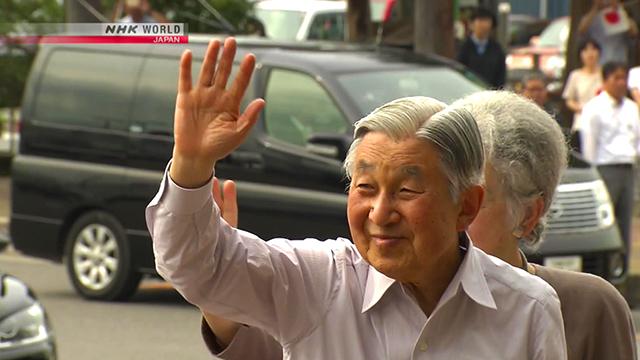At age 55, Emperor Akihito succeeded his father, Emperor Showa, whose given name was Hirohito. Emperor Akihito became the first to take the throne as the "symbol of the State" under Japan's post-war Constitution.
"I hope to seek a new style for the Imperial family befitting a modern age."
Emperor Akihito
Since then, the Emperor has attended a much higher number of public engagements than his father. He's said to believe that taking part in them is what's required of an Emperor aside from performing "acts in matters of state" as stipulated by the Constitution.
The Emperor and Empress have visited disaster-stricken regions to console people. They include the 1995 earthquake that devastated Kobe and surrounding areas in western Japan as well as the 2011 earthquake and tsunami in the country's northeast.
The Emperor and Empress have also shown their compassion for the socially vulnerable. Every year, they visit homes for people with disabilities and senior citizens. And they've visited World War 2 battlefields to pay tribute to the victims of the war.
Each year, they attend the government-sponsored memorial ceremony.
"Reflecting on our past and bearing in mind the feelings of deep remorse over the last war, I earnestly hope that the ravages of war will never be repeated. Together with all of our people, I now pay my heartfelt tribute to all those who lost their lives in the war, both on the battlefields and elsewhere, and pray for world peace and for the continuing development of our country."
Emperor Akihito
In 2003, the Emperor underwent surgery for prostate cancer. He also had a heart bypass operation in 2012.
Ahead of his birthday last December, the Emperor revealed he was feeling his age "more often." He acknowledged having made mistakes during ceremonies, adding that he would try not to make any more. Sources say the Emperor appears to be stressed and anxious at the thought that someday soon, he may not be able to perform at the level he desires.
In May this year, Imperial Household Agency officials announced they were cancelling some of the Emperor's and the Empress' official activities. They said it was because of the couple's age.
Sources say the Emperor had reservations about drastic cuts the officials initially proposed. So the changes ended up being limited. The Emperor has consistently said that the title should be held by one who can fulfill the duties.
No Legal Provision for Abdication
The current law covering the Imperial household does not mention abdication. It says succession takes place only when the Emperor passes away. He is to be succeeded by the next member of the Imperial family in line for the throne.
One way of allowing the Emperor to abdicate would be to revise the Imperial House Law. Another way would be to enact other legislation.
Government officials are expected to carefully consider the content of the Emperor's message and are planning to ask experts from various fields on their views before taking the next steps.
Past Abdications
In the long history of Japan's Imperial family, nearly half of the Emperors have stepped down. It's been nearly 200 years since the last one did so. But in recent years in Europe, there have been a number of abdications.
Queen Beatrix of the Netherlands announced her abdication in January 2013. In July of the same year, Belgium's King Albert II said he was stepping down due to old age. And in Spain, King Juan Carlos passed on the throne to his son in 2014.
